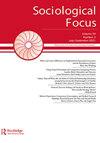Beyond Adherence: The Healthwork of People Living with HIV in Nigeria
Q2 Social Sciences
引用次数: 0
Abstract
ABSTRACT Following the introduction of highly active antiretroviral therapy (HAART) in 1996, adherence was regarded by biomedical researchers as the only way to manage HIV effectively in everyday life. The sociological critique of this biomedical stance posits that the everyday management of HIV goes beyond the biomedical conception of adherence, as HIV-positive individuals undertake healthwork practices that form the basis of HIV management. Using symbolic interactionism and social context theory to ground the lived experience of healthwork, this paper explores the kinds of healthwork people living with HIV in Nigeria undertake. Drawing from 32 semi-structured interviews with HIV-positive individuals living in Nigeria, it was observed that healthwork is an individualized practice including spirituality, testing, counseling, adherence, concealment, dieting, and support-group participation. These practices are shaped by the sociocultural, economic, political, and structural factors in the Nigerian context. Meaningful healthwork practices were informed by the personal responses to HIV diagnosis, and such practices were tied to formal rules, local dynamics, and contextual issues that are shaped by structural and institutional factors. This paper contributes to sociological knowledge on HIV management by demonstrating the importance of context and meaning in the design of health interventions and programs connected with the lived experience of people living with HIV.超越坚持:尼日利亚艾滋病毒感染者的健康工作
摘要自1996年引入高效抗逆转录病毒疗法(HAART)以来,生物医学研究人员将坚持治疗视为在日常生活中有效管理艾滋病毒的唯一途径。对这一生物医学立场的社会学批判认为,艾滋病毒的日常管理超出了坚持的生物医学概念,因为艾滋病毒阳性者从事的健康工作实践构成了艾滋病毒管理的基础。本文运用象征互动主义和社会语境理论,以健康工作的生活体验为基础,探讨了尼日利亚艾滋病毒感染者从事的健康工作类型。根据对居住在尼日利亚的艾滋病毒阳性者的32次半结构化访谈,我们发现健康工作是一种个性化的实践,包括精神、检测、咨询、坚持、隐瞒、节食和支持小组的参与。这些做法是由尼日利亚的社会文化、经济、政治和结构因素形成的。有意义的卫生工作实践是由个人对艾滋病毒诊断的反应提供的,这些实践与正式规则、地方动态以及由结构和体制因素决定的背景问题有关。本文通过证明背景和意义在设计与艾滋病毒感染者生活经历相关的卫生干预措施和计划中的重要性,为艾滋病病毒管理的社会学知识做出了贡献。
本文章由计算机程序翻译,如有差异,请以英文原文为准。
求助全文
约1分钟内获得全文
求助全文

 求助内容:
求助内容: 应助结果提醒方式:
应助结果提醒方式:


